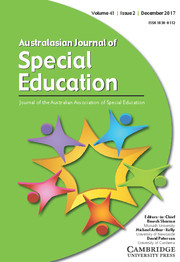Article contents
Meeting Initial Needs In Literacy (MINILIT): Why we Need it, How it Works, and the Results of Pilot Studies
Published online by Cambridge University Press: 26 February 2016
Abstract
As students who have difficulty in acquiring the basic processes in reading are significantly disadvantaged in later schooling, there is a need for effective interventions for young at-risk students. Reading Recovery is the most widely known and extensively promoted intervention for young struggling readers. However, serious reservations have been expressed about both its efficacy and its cost-effectiveness. An alternative intervention (MINILIT), that incorporates findings and recommendations of recent reviews of research about effective instruction in early literacy, has been developed. This intervention features small-group instruction by tutors. The results of three pilot studies of MINILIT are presented. These studies were carried out with Year 1 and Year 2 students in a variety of settings. The students, who were identified as struggling readers by teachers in their schools, attended tutoring sessions for one hour a day, four days a week, for 15 weeks. Pre-testing of individual students on standardised and curriculum-based tests was carried out prior to the intervention and testing was repeated after 15 weeks. Data indicate that students who completed the intervention made significant and substantial gains in both reading and spelling. Results suggest that MINILIT may be a viable intervention that may achieve results similar to, or better than, existing programs with greater cost-effectiveness.
- Type
- Conference Paper
- Information
- Copyright
- Copyright © The Australian Association of Special Education 2007
References
- 3
- Cited by


